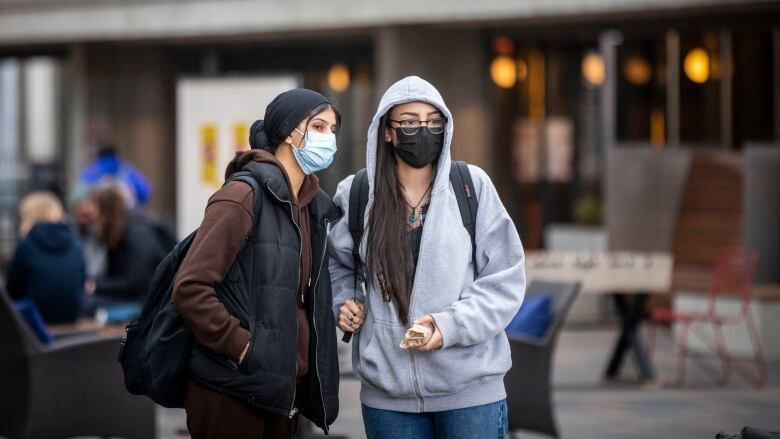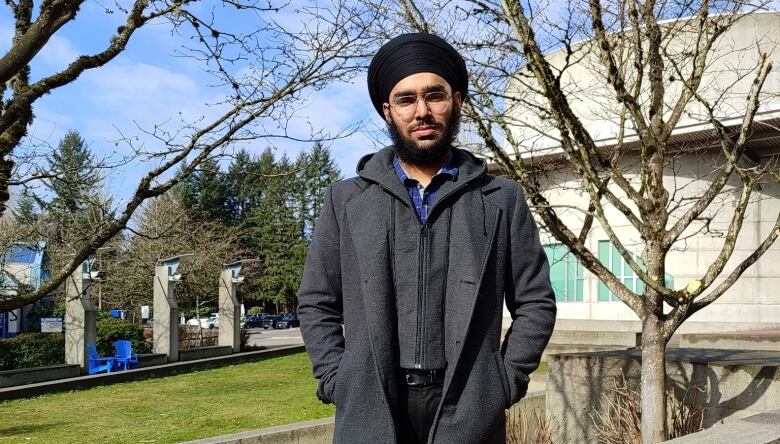International students are now able to work full time. What that means for B.C.'s economy
Immigration consultants say the new rules could curb exploitation, but some students worry about workload

Business leaders say a federal pilot project that allows international students to work full time could benefit B.C.'s economy, even as student advocates worry about its impact on workload.
Experts say the move couldhelp employers struggling with labour shortagesandprovide them with more flexibility and job security.
Under a pilot project from the federal government that began on Nov. 15 and lasts until the end of next year, international students areallowed to work full time during the school term.
Previously, they were limited to 20 hours of paid work outside their studies for each week class was in session.

Amandeep Kaur, a criminology student from India, is one of the students now working full time up to 40 hours a week as a security guard in Vancouver.
Prior to the change, her work hours were capped at 20 hours a week while she juggled studies at Kwantlen Polytechnic University (KPU) in Surrey, B.C.
"It's good because we can earn more for our fees," the 26-year-old told CBC News. "Because KPU is a very expensive university.
"[But] it's more pressure. If you work 40 hours with your studies, it's going to be like your focus totally diverts from your studies to your work."
Karandeep Singh Sanghera, the president of the Capilano University Students Union,said the rule change came after sustained advocacy from studentgroups, particularlyafter an Indian student was arrested in 2019 for working more than 20 hours.

Pilot projectcould bring thousands into job market
In introducing the pilot project, Immigration Minister Sean Fraser said the move could bring 500,000 international students into the workforce across Canada.
There were nearly 509,000 university students in B.C. during the 2020/21 academic year, according to an Education Ministry spokesperson. Of those students, 151,185 were international students.
Anita Huberman, the CEO of the Surrey Board of Trade, told CBC News there would be an "immediate positive impact" on businesses after the rules were changed.
"Lifting the 20-hour cap is really going to significantly help businesses to meet their goals in terms of budget, selling products, selling services," she said. "International students are a labour pool that we need to draw from."
Patrick Mackenzie, the CEO of the Immigrant Employment Council of British Columbia, said that while immigration has historically been a big contributor to Canada's workforce, the new rules could help reduce the exploitation of student workerswho previously worked more hours than they were allowed.
"They may have been forced to work [previously] under the table, and that puts them in a precarious spot," he said. "Now they can do it within the light of day if that's what they were doing, and that could only be good for them."
Mackenzie said it was now up to universities to better prepare international students for the job market.
He says schools should look to immediately equip students with Canadian cultural norms in the workplace, how to navigate labour marketsand how to operate in Canadian workplaces.
No benefit for permanent residency program
But even as experts have welcomedthe move as a boon to the labour market, for students, full-time work during school doesn't count towards the coveted permanent residency status under popular entry streams.
"It is more for the Canadian economy rather than the benefit of the international student. That's just my personal feeling," said Adam Choi, director of international student relations at the University of Victoria students' society.
Even as rights groups, like the Migrant Workers' Alliance for Change, have heralded the move as a win for students' rights, they also say Ottawa should recognize extracurricular work experience under the federal government's permanent residency program.

Currently, work during school terms doesn't count towards the popular Canadian experience class immigration program, which only seeks skilled workers who have post-graduation work experience.
A spokesperson for Immigration, Refugees and Citizenship Canada said in a statement that it couldn't comment on future policy or program decisions.
With files from Sarbmeet Singh












_(720p).jpg)


 OFFICIAL HD MUSIC VIDEO.jpg)
.jpg)



























































































